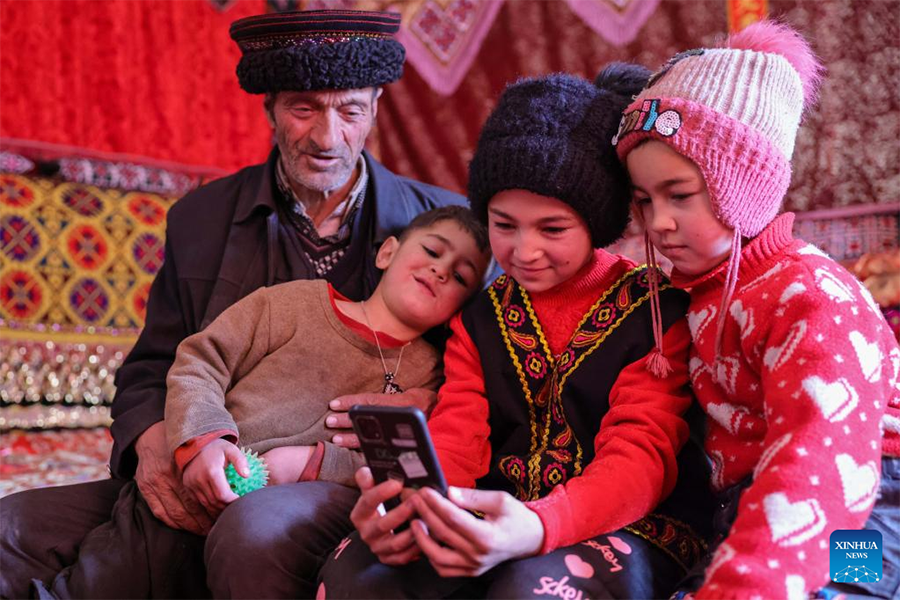
Children watch videos on a mobile phone with a family member in Rasekam village of Taxkorgan Tajik autonomous county, Northwest China's Xinjiang Uygur autonomous region, Feb 24, 2022. [Photo/Xinhua]
By He Zhipeng and Du Qing
Japan's House of Representatives adopted a resolution on Feb 1, expressing concern over so-called human rights issues in China's Xinjiang, Tibet, Inner Mongolia and Hong Kong.
That the resolution disregards facts, denigrates China's human rights record, violates international law and international relations norms, and sets a negative example for China-Japan relations goes without saying.
In fact, the resolution is the result of some Japanese politicians dancing to the tune of a country in order to smear China. Given its deplorable record of gross human rights violations and committing innumerable crimes before and during World War II, Japan has no right to say anything about any country's human rights record.
Despite being a highly developed and modern society, Japan is plagued by widening wealth disparity, with a large number of single-parent families and elderly people living in poverty. Also, Japan has the highest suicide rate among developed economies.
The fast rising aging population has put a strain on Japan's pension system, and despite safety risks, frail elderly people have to take care of each other due to a lack of caregivers. Actually, many people in Japan seem to have lost hope in the future, given the demographic shift.
In addition, workers' rights are not fully protected in Japan, because employers demand loyalty from their employees, that is, they should work for the same company throughout their lifetime. This means employees are more likely to end up working overtime instead of changing jobs. No wonder work-related issues are a contributing factor to suicides, depression and death from work-related exhaustion.
Gender-based inequality, too, is manifested in various aspects of social life in Japan. Although the government introduced the Equal Employment Opportunity Law in 1986 to promote gender equality in the workplace, women are still discriminated against in almost every field in Japan. And since women, in most cases, have to do all the housework as well as take care of the children, for which they have to quit their jobs or seek long leaves-and lose the chances of promotion or increment-they are having fewer children, or none at all.
Also, quite a number of college graduates in Japan are stuck in temporary jobs and therefore don't earn enough to lead a decent life. These people are not covered by the social security system, with some of them even being homeless, so they hardly get married or have children, and are vulnerable to social atrocities and susceptible to contagious diseases.
Moreover, minority groups and immigrants from Asian and African countries face discrimination in Japan. These marginalized populations are treated unfairly, both politically and economically. As for the indigenous people of Japan, contrary to the Japanese government's promise, they are still struggling for social equality in employment, housing, marriage and other fields.
Some data show the numbers of child abuse and mistreatment of elderly people by family members and/or nursing staff are high in Japan, perhaps because many Japanese people cannot stand the sound of crying babies and are indifferent to the needs of the aging population.
Besides, mafia groups are still active in Japan and pose a threat to the Japanese people and society.
So it seems the Japanese government has been passing weird resolutions in a bid to cover the social and economic discrepancies, which inadvertently or otherwise could drive some Japanese people toward militarism, posing a serious threat to China and other neighboring countries.
Therefore, the Japanese government should enhance its governance capability and structure, and take measures to better protect human rights and improve people's well-being, instead of pointing fingers at other countries.
And those belligerent Japanese politicians should be reminded that they should take steps to first protect Japanese people's human rights, rather than leveling false charges of human rights violations at other countries.
He Zhipeng is director of Jilin University Human Rights Center and Du Qing is a research fellow of Jilin University Human Rights Center.

 中文
中文



